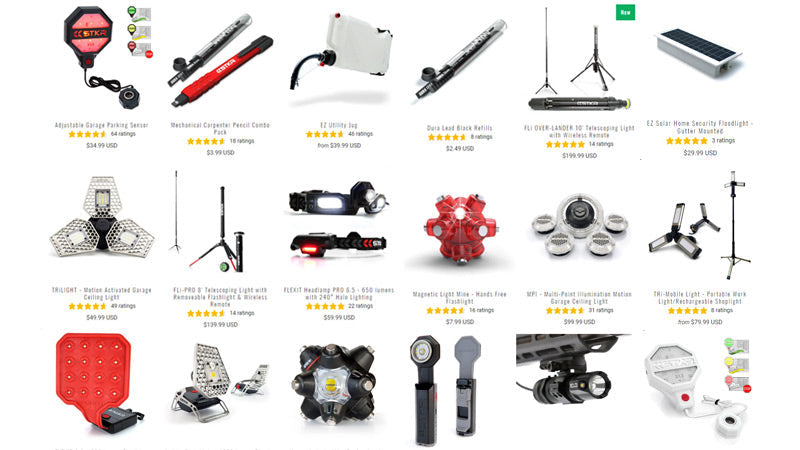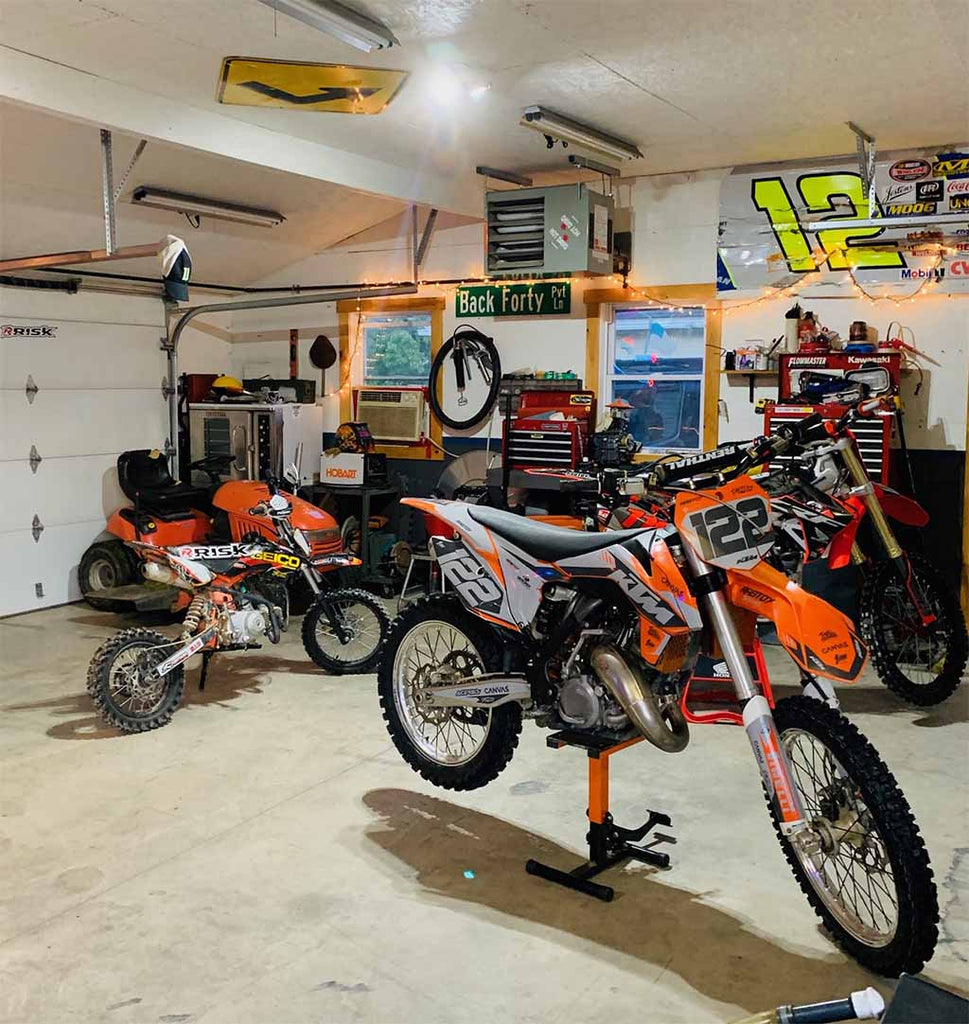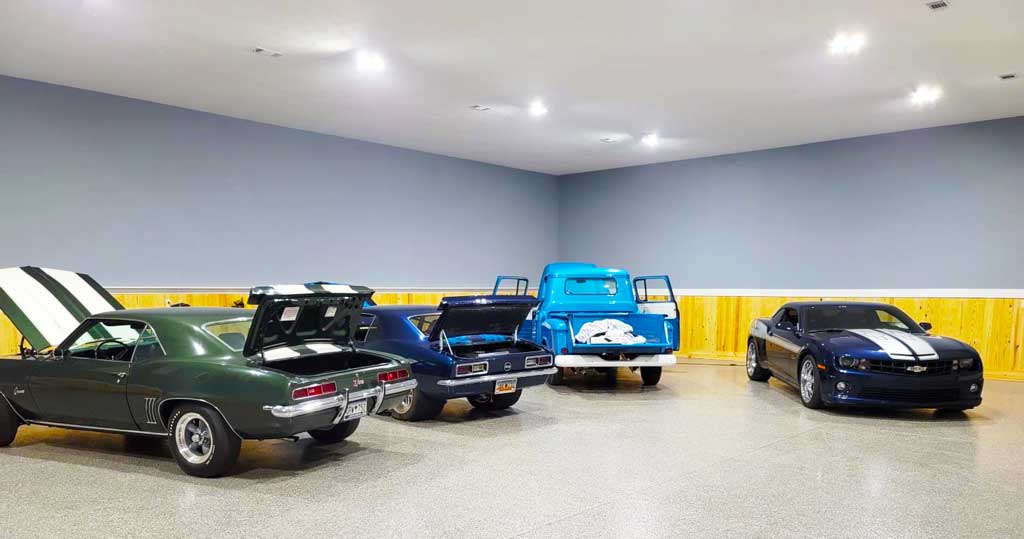
How Can I Brighten Up My Garage?
Share
Most garages are designed for residential purposes. They seem to have just enough light to get you safely from your car door to the house. But if you’re anything like me, you don’t just use your garage to park your car. You use your garage as a functional work-space for working on your car, home gym, workshop, or craft area, and therefore need more light. Below are several ways you can brighten up your garage without the added expense of calling an electrician.
You can brighten your garage by increasing the light output of your light bulbs. This can be done by buying a higher lumen bulb or a full room lighting system that uses only one bulb socket. Alternatively, you can introduce natural light or paint the walls a lighter color.
I will go into more detail regarding how you can apply this to your garage. Having dim lighting can be dangerous, slow your workflow, and decrease the quality of your work. I will explain why, but first, let’s take a look at how you can brighten up your garage.
Brightening Up Your Garage
Increase the Light Output
Light output is measured in lumens. This directly correlates to the visible brightness of the bulb. So when you’re looking for a brighter bulb for your garage, you need to find one with more lumens.
The minimum recommendation for a single garage is 4,000-6,000 lumens, whereas a double garage is 6,000-10,000 lumens. Considering a 60-watt standard (incandescent) bulb is only 800 lumens, you can see why your garage might seem a bit dim!
Something that often gets confused with brightness is the wattage of a light bulb. When referring to the wattage, the manufacturer is describing how much energy the bulb uses. Increasing the watts will proportionally increase the lumens, but some bulbs will require more watts to produce the same brightness.
Three of the most common bulbs we see on the shelf are incandescent lights, LEDs, and fluorescent lights. The same wattage in each of these lights will produce a different brightness, whereas the same number of lumens will essentially look the same.
This is why watts and lumens can sometimes be confusing. To put it simply, bulbs with lower wattage for the same output are more energy efficient. LEDs are the most energy-efficient, while incandescent lights are the most energy-hungry. Fluorescent lights are in-between these two; they’re not as efficient as LEDs, but still pretty close.
We choose to use LEDs in our products for several reasons. You can read more about why we choose to use LED technology here.
There’s a lot to consider when choosing the right bulb to brighten up your garage, including the brightness of your garage walls. So if you’re interested in reading more about lumens and the brightness of different lights (with pictures!), click here.
It is possible to find single bulbs that emit 4,000 lumens, but this comes with its disadvantages. Having a central light-source means that you might experience inconsistent lighting in your garage. You will also experience shadows if working over a bench or standing in front of a storage unit.
This is why you might want to consider increasing the number of lights in your garage.
Increase the Number of Lights
When brightening up your garage, you can add many lower-output lights together to reach the required number of lumens for your space.
Do you only have one light socket? That’s not a problem. You can find adaptors to convert one light socket into multiple. This means you can achieve 4,000 lumens with two 2,000 lumen bulbs or four 1,000 lumen bulbs. (And if you've studied your classic Christmas movies, then you know it's not a good idea to overload one circuit with a zillion splitters!)
To save buying an adaptor, several bulbs, and more homeowners insurance, you can find the all-in-one solution in our ceiling-mounted TRiLIGHT. Three lights combine to light your garage with 4,000 lumens in the one light socket.
But if you want a more even spread of light around the room, we also have the MPI, or Multi-Point Illumination. This light uses a single-socket, with four lights branching off that can be stretched to every corner of the garage ceiling.
The above are examples of ceiling-mounted lights. However, there are other types of lights that can be used in your garage. Here’s a quick outline of some other options:
- Trouble Lights: mobile bulb on the end of a wire, surrounded by a cage. Can plug into any power socket in the garage.
- Shop Lights: usually long tubular lights that hang from the ceiling by chains. Need to be installed.
- Pendant Lights: Single bulbs hanging from the ceiling by wire. Need to be installed.
- Sconces: Wall-mounted lights. Need to be installed.
These lights are still an option, however, if you don’t already have the sockets, they will need to be properly installed. Unless you have some form of experience installing electrical wiring in the ceiling or walls, you will need to call an electrician. This means more money.
Trouble lights can be plugged in anywhere, but they can get very hot. This is why the bulb sits in a cage. The cage protects the bulb from becoming damaged and protects you from the heat of the bulb. This is not an issue when using lights made of LEDs.
Our alternative solutions to ceiling-mounted lights include the TRiLIGHT ShopLight and the Mobile Task Light, both of which use LEDs. These mobile lights can be plugged into any power socket in the garage, and the Mobile Task Light can even be used wire-free.
Unlike traditional shop lights, the TRiLIGHT ShopLight is not chained to the ceiling but has a hook that allows it to be used anywhere in the garage. This is the same for the Mobile Task Light, as you can set it down/hang it from almost anything as it weighs just under a pound. In addition to this, the LED will not produce the same heat as a traditional bulb, meaning that cages are not required.
These lights can be used instead of the MPI when increasing the number of lights in your garage. The main difference is that the ceiling-mounted lights are used more for general lighting, whereas the task and shop lights are used to light up a workstation or be carried around from area to area.
Regardless, these mobile lights are a great addition to the lighting of your garage. They can be moved around the room, above your head or on the floor, and can plug into a regular 110 volt power socket.
Alternative Methods to Brighten Your Garage
Other considerations that affect the brightness of your garage are the interior paint and natural light.
If you use darker paint for your walls or have exposed raw materials such as concrete or brick, the light will be absorbed and darken your garage.
If you have bright walls and flooring, the light will reflect and help to brighten the room. This is why you’ll notice a lot of bright workshops have white walls.
In addition to this, adding windows to the garage or having a skylight will introduce natural light into the room. This is great during the day but will make your garage hotter from the sun.
You also cannot control the direction of the light, and natural light sources will be useless at night. If you live in a country with shortened daylight hours, you will be very limited regarding when your garage can be used. Privacy also becomes an issue.
The Importance of a Bright Garage
Choosing the right amount of light for your garage is dependent on what you are using it for. Whether you are simply storing your car or using it as a workshop, you will still want to have enough light to do what you need to do and prevent injury.
Having a dimly-lit garage creates a tripping hazard if you have anything on the floor, such as cables or boxes. In a workshop setting, you will struggle to see your tools, resulting in an increased risk of injuring yourself or making mistakes.
Low light can also make it difficult to find things. If you have your tools stored in a cupboard or cabinet, these areas will be even darker because of all the shadows. This can be very frustrating if you are trying to find a specific tool and not wanting to waste time.
Another important consideration is the change of color in dim light. Have you ever noticed that, as it gets darker, the world starts to appear more black and white? The midday sun is our reference for the amount of light required to see colors in their most accurate form.
This is particularly important if you are using your garage for painting or woodwork. The colors in a dimly-lit garage will look completely different when exposed to the sun. This is why our products use 5400K color temperature, known as ‘daylight white’.
Some people might use additional lighting more as a feature, such as lighting up a bike or trophy collection. Whatever you choose to use your garage for, the lighter, the better.
Use caution when selecting lighting for your home. Make sure the light you plug into your home or screw into your light socket is certified to “UL” or SGS “Q” standards. Since we invented the Trilight, many cheap copies flooded the market that could be unsafe due to sub-standard components and materials. Some of the copy TRILIGHTS are called Triburst or “deformable” lights. They are considerably cheaper, but make false claims about their brightness and warranties. If you want the original, contact STKR and speak to the friendliest with the best customer service. They are always available and based in North Carolina!
I hope this has helped you find some new alternatives for lighting up your garage.









